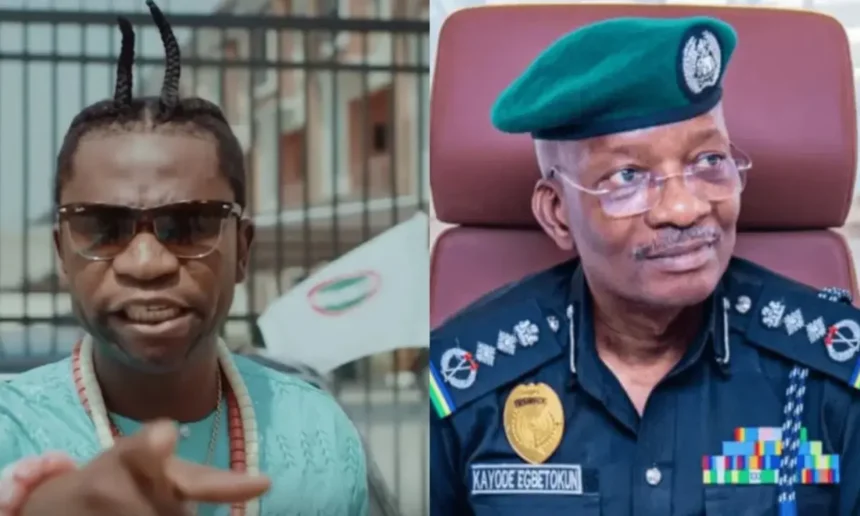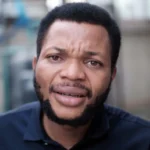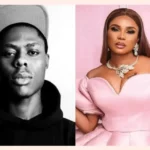Embattled Nigerian rapper Speed Darlington has taken legal action against the Inspector General of Police (IGP), Kayode Egbetokun, following his alleged unlawful detention. Darlington, who had been embroiled in controversy over his comments about Nigerian singer Burna Boy, was arrested and detained by the police after being accused of defaming and cyberstalking the popular artist.
Arrest and Detention
The incident unfolded when Speed Darlington made public remarks about Burna Boy, which led to accusations of cyberstalking and defamation. His comments reportedly caught the attention of the police, leading to his arrest. Despite being granted bail by the Federal High Court in Abuja on December 23, 2024, Darlington’s legal troubles did not end there. According to reports, after being granted bail, Darlington was still held in police custody, sparking further concerns about the legality of his detention.
In a social media video, Darlington’s lawyer accused Burna Boy of allegedly using his influence and financial resources to have the rapper detained by the police. The claim that Burna Boy might have paid the police to keep Darlington in custody raised eyebrows and fueled tensions in the public discourse surrounding the case.
Court Order for Release
On January 6, 2025, the Federal High Court intervened, mandating that the police release Speed Darlington in accordance with the earlier bail granted. The court’s ruling marked a significant development in the case, signaling that the rapper’s continued detention without just cause was unlawful. Despite this court order, Darlington quickly filed a lawsuit, demanding compensation for the violation of his rights.
N300 Million Lawsuit Against the IGP
Following the court’s ruling for his release, Speed Darlington wasted no time in filing a N300 million lawsuit against IGP Kayode Egbetokun, accusing the police of unlawfully detaining him. In the lawsuit, Darlington seeks compensation for the infringement of his fundamental rights, which he believes were violated during his detention.
The rapper’s legal team, led by his lawyer Abubakar Marshal, has taken the matter to court in an effort to secure redress and hold the authorities accountable for what they describe as a breach of Darlington’s rights. The case is expected to be heard on January 13, 2025, with the Federal High Court in Abuja slated to review the details of the lawsuit.
The Legal Process
On January 6, the court set a date for the hearing of Speed Darlington’s fundamental rights enforcement suit against the police, with the police’s lawyer, Garba Audu, seeking an adjournment to review and respond to the suit. The case will now be heard on January 13, 2025, where both parties will present their arguments regarding the legality of Darlington’s detention and the alleged abuse of power by the police.
The Fallout and Public Reactions
The case has generated significant attention, particularly due to the public figures involved. Fans of both Speed Darlington and Burna Boy have weighed in on social media, with many expressing their opinions on the situation. The controversy has also sparked discussions about the use of power by law enforcement and the potential for celebrities to use their influence in legal matters.
While Burna Boy has not publicly commented on the specific allegations made by Darlington, the rapper’s accusations of police bribery have added an extra layer of complexity to the ongoing legal battle. The issue of defamation and cyberstalking remains central to the case, as Speed Darlington’s comments about Burna Boy continue to be scrutinized by both the public and the courts.
Conclusion
Speed Darlington’s legal battle against the Nigerian police and the Inspector General of Police, Kayode Egbetokun, has brought attention to issues of unlawful detention, police misconduct, and the potential abuse of power in celebrity-related legal disputes. With a N300 million lawsuit now filed against the IGP and a scheduled court hearing set for January 13, 2025, the rapper is seeking justice and compensation for the violation of his rights.
As the case progresses, it will likely continue to spark discussions about the intersection of law enforcement, celebrity influence, and the protection of individual rights in Nigeria. Both the public and the legal community will be closely watching to see how the court addresses the claims of unlawful detention and the broader implications for the country’s legal system.




